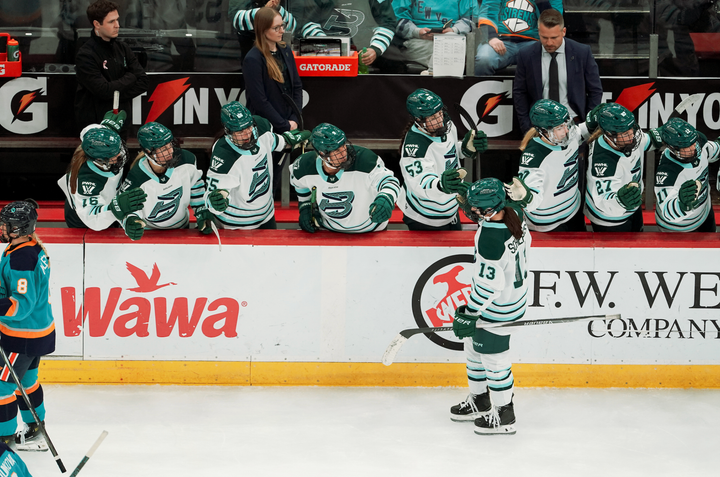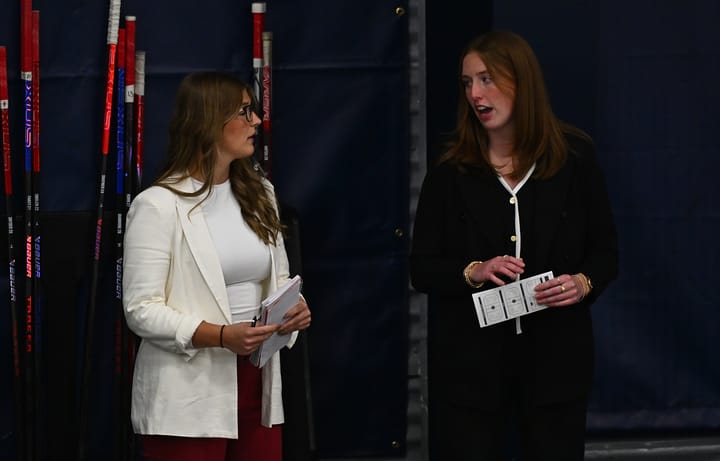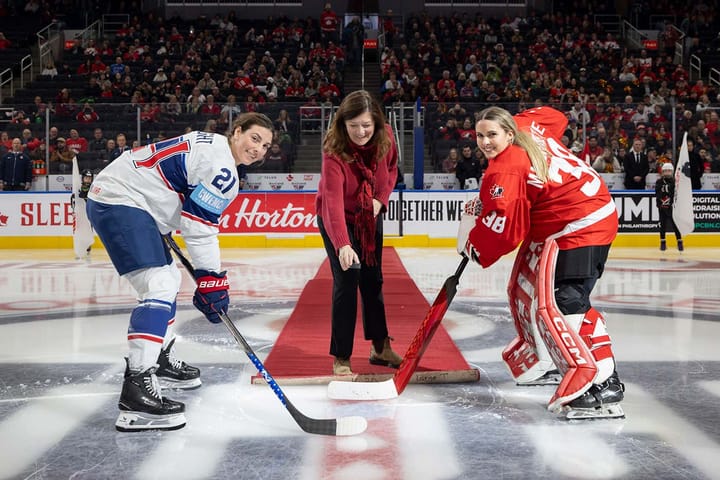Whale’s Alyssa Wohlfeiler is pumped for the Isobel Cup Playoffs
Alyssa Wohlfeiler took notice last week of the brutal inequity between the workout facilities of the men’s and women’s teams competing in the NCAA basketball tournament.
As a professional athlete who spends as much time in the gym as any player in any league, Wohlfeiler pointed out that “the disparity is almost laughable considering how prevalent social media is these days and how it’s nearly impossible for those ridiculous discrepancies to be kept secret. Women need and have earned the same training equipment. My workouts have been a big part of my hockey career and why I’m able to keep playing at a high level.”
Wohlfeiler has been training since she was 12 years old. Today, at 31, she is the leading scorer this season on a Connecticut Whale team that faces Minnesota tomorrow night in a single-elimination Isobel Cup Semifinal on NBCSN and Twitch. Her relentless commitment to conditioning, in addition to her hockey skills and sense, have taken the California native to a scholarship and four years at Northeastern to a nine-year pro career of three seasons each in Europe, the CWHL and the NWHL.
This season, living in Danbury, Conn. while playing for the Whale, Wohlfeiler’s home away from home is the Iron Factory Gym in nearby Brookfield. She’s there regularly for two hours in the late morning. In the powerlifting section of Iron Factory, Wohlfeiler has plenty of space to herself, which has been an enormous plus in the ongoing pandemic. (The images of portions of the Wohlfeiler Workout – designed by Wohlfy for Wohlfy – were taken there).
Before the Whale bus left Danbury for Boston, we spoke with Wohlfeiler about training, the Whale and the big game against the Whitecaps.
Your training program seems to be a one-woman operation. Have you found that you’re your own best conditioning coach?
Over time, yes. I love fitness and I’m constantly learning about it, researching. I’m old-school. I write everything down. My table is full of stacks of papers and training books. I plan out my training programs week by week. They’re not on my phone.
The way I see it, no one knows their body better than you. So my programs are based on what works best for me as a hockey player. If we have practice that night, I’ll have a specific workout. The morning after a practice, I’ll lower the intensity.
I plan out my entire off-season program as a big picture to make sure the timing is correct so that I peak for the season. Then I break it down into phases lasting anywhere from 4-8 weeks. Then I break those down into weekly programs that I write out.
How about in the days leading up to the big tilt Friday against Minnesota?
Once we get to 48 hours before puck-drop, it’s only hockey. For me, that’s what I’ve found is the proper time to cut off strength training before a game.
When you were 12 and in California, what was the inspiration for beginning your training?
My dad was a member of the LAPD S.W.A.T. force. He had to be fit and he was really committed to his training. That inspired me. I’m living in California and I’m dreaming of being a successful hockey player and making a Division I college team. I wanted to do everything possible to get better at hockey. That led to increasing my commitment off the ice as much as at the rink.
I’ve always had a passion for it, but I would say over the last few years, I’ve dug in even deeper than ever. I love the game today as much as I ever have. Keeping my fitness level high helps me continue to compete with all these great young players, like the ones who joined the Whale this season.
At Northeastern and in your time in the NWHL with the Pride and Whale, did you feel like you had access to the level of workout facilities you needed?
After my sophomore year at Northeastern, they did a major renovation of Matthews Arena and we got a brand new, beautiful gym. The men’s and women’s hockey teams shared it equally. My only gripe was we couldn’t be in there unsupervised and I wanted to be in there a lot, but hey, NCAA and school rules. [laughing] I get it.
I really enjoyed the resources we had last season with the Pride. We practiced at Thayer Academy in Braintree and had a lot of extra ice available in the mornings. I took advantage of that all the time. At the Whale, the team has a good partnership with Prentiss Hockey Training in Stamford. My teammates are there all the time, but obviously everyone’s schedules are different and I love the freedom to do my own thing. The coaches know how much time I’m at Iron Factory.
How big is this opportunity for you and the Whale to compete for the Isobel Cup?
It was really huge for us to get our team re-grouped after Lake Placid, so I appreciate what the league did and all the work [GM] Amy Scheer and Colton Orr, the coaches and staff have done. This is a big step for the NWHL, having these three games on NBCSN.
Your teammates have described you as looking like you are “on a mission” since the first day of practices. Are they right?
A big part of it was being on the Boston Pride last year, winning every game except one, and then not getting the chance to play the Cup Final because of the pandemic. I saw in my first practice with the Whale that we had a group with a legit chance to contend. I was determined to lead in my own way and play to the best of my ability. There was something about this group. I was not going to let them down.
Colton and I talked a lot in the offseason. We wanted to change the feel in the locker room. My personality is to be blunt and outspoken, so that tends to happen naturally. I’m not trying to set an example, but I’m glad to hear I’ve been a good example.
What makes your line with Katelynn Russ and Emma Vlasic a formidable unit?
Our puck possession in the offensive zone. We’re always looking to make plays. Russ has a pretty good shot. If I give her the puck, she’ll get it on net. Pickles is very good at finding the open scoring areas.
What does your team have to do to beat Minnesota and advance to the Cup Final?
We have to set the pace. We know they’re a fast team. They like to attack. We have to take that and throw it in their face.
Would you say you’re playing as well these last two years as ever?
Age is a mindset! Physically, I feel better than ever. Mentally, I feel stronger than ever. I may be playing the best hockey of my career.
Has the pandemic and challenges that have come with it fueled your love of the game?
That’s fair to say. Around the time the Whale were getting ready to open camp, I thought that I’d better go all out because you never when the next hockey game would be – or even possibly when my last game would be. Gyms were closed, so it forced me to work on my conditioning and cardio. The commitment to having a great season with the Whale started then.
Have you considered how many more seasons you hope to play professionally?
I’m playing well, doing my part for the team, but I’m driven to keep making improvements. I focus on being the best player I can possibly be to help put my team in position to win the game because ultimately that’s the only thing in my control.
I love to play more than ever. I love training. When I don’t love either of them anymore, that’ll be the end for me. But I have no intention of retiring anytime soon.





Comments ()